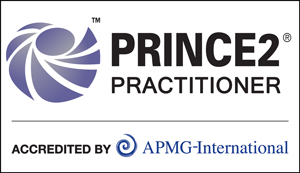PRINCE2® (an acronym for PRojects IN Controlled Environments) is a de facto process-based method for effective project management. Used extensively by the UK Government, PRINCE2® is also widely recognized and used in the private sector, both in the UK and internationally. The PRINCE2® method is in the public domain, and offers non-proprietorial best practice guidance on project management.
Benefits of choosing the PRINCE2® Practitioner certification are:
- Learn how to manage projects or to work in a project environment using the most internationally recognized project management method
- Ensure that team members focus on the viability of the project in relation to its business case objectives - rather than simply seeing the completion of the project as an end in itself
- Promote consistency of project work and the ability to reuse project assets while facilitating staff mobility and reducing the impact of personnel changes/handovers
- Design plans and reports to meet the needs of each level in the project team and Project Board, improving communication and control
- Mitigate perceived problems and issues and focus on the viability of the project throughout
- Evaluate the project portfolio to bring clarity and allow improvements in reviewing projects
- Globally recognized professional certification
- Approach to justify the start, continuation and closure of a project
- Identification and management of risks
- More effective planning approach based on stage by stage planning principles
- Processes and rules to control changes to the project and project deliverables
- Control mechanisms that facilitate progress monitoring
Who should take the PRINCE2® Practitioner certification?
- Professionals who want to strengthen their PM skills and establish their knowledge and experience in managing projects in the global market should take PRINCE2® Practitioner certification
- Project Managers
- General Managers
- Programme Managers
- CIOs and planning officers
- Team Managers and support staff
- Operations managers
- Engineering managers
- Development leaders
- Staff who will have a defined role
- Project Management Consultants
Options
- Classroom training
- e-Learning access
Syllabus
The Practitioner is the second of the two PRINCE2® examinations you are required to pass to become a Registered PRINCE2® Practitioner.
This PRINCE2® examination is aiming to measure whether a candidate would be able to apply PRINCE2® to the running and managing of a project within an environment supporting PRINCE2®. To this end they need to exhibit the competence required for the Foundation qualification, and show that they can apply and tune PRINCE2® to address the needs and problems of a specific project scenario, specifically, candidates must be able to
- Produce detailed explanations of all principles, themes and processes and worked examples of all PRINCE2® products as they might be applied to address the particular circumstances of a given project scenario
- Show they understand the relationships between principles, themes and processes and PRINCE2® products and can apply this understanding
- Demonstrate that they understand the reasons behind the principles, themes and processes of PRINCE2®, and that they understand the principles underpinning these elements
- Demonstrate their ability to tune PRINCE2® to different project circumstances
Exam
- Objective testing
- 8 questions - 10 question items per question, each worth one mark
- 44 marks or more required to pass (out of 80 available) - 55%
- Open book exam (official PRINCE2® manual only)
Duration of exam
2.5 Hours (150 minutes)
Prerequisite
You cannot attend the PRINCE2 Practitioner exam until you have successfully passed the PRINCE2® Foundation qualification.
Certification Validity
Candidates who pass the practitioner exam are recognized as a "PRINCE2® Registered Practitioner". Individuals will remain registered for a period of 5 calendar years. To maintain the registered status, practitioners must complete and pass a PRINCE2® re-registration examination 3-5 calendar years following their initial/previous practitioner certification.
